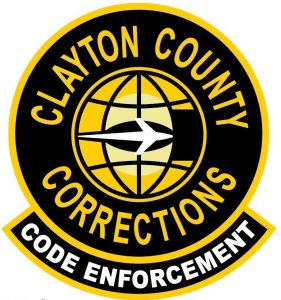
Warden:
Dennis Nelson
Deputy Warden of Security
Ray Amey
Deputy Warden of Administration
Neysa Mayfield
11420 S.L.R. Boulevard
Lovejoy, GA 30250
Phone: (770) 473-5777
Fax: (770) 473-5783
Code Enforcement
Phone: (678) 610-4755
Refuse Control
Phone: (770) 477-3548


Code Enforcement


Major Sean Macdonald
Division Commander


| Operational Hours: | Monday – Saturday | 8:00 AM – 4:00 PM |
| Office Hours: | Monday – Friday | 8:00 AM – 4:00 PM |
| Complaint Line for Code Enforcement: | 678-610-4755 | |
All Code Enforcement operations (residential and commercial) have been moved and reorganized under the Clayton County Corrections Department as a division of.
The director of the Clayton County Corrections Department is warden Dennis Nelson and his phone number is 770-473-5777.
The new Code Enforcement Division is under the command of Major Sean Macdonald.
The current location at 1669 Flicker Road is still the public location for residential code enforcement.
Online County Ordinance
Click Clayton is an easy way for anyone to report non-emergency issues to Clayton County, Georgia while on-the-go, such as potholes, damaged street signs, street maintenance, street light issues, damaged trees, park maintenance and more. Simply drop a marker on the map where you noticed a concern, answer a few questions to help us understand what needs to be fixed and include a photo when possible. Residents can track the status of reports they or other members of the community have submitted and learn when they have been resolved. Click Clayton makes it easier than ever to report a problem.
or
Get the Click Clayton Mobile App
Code Enforcement Process
Complaint Filed
A Complaint is reported to Code Enforcement by phone, email or the ‘Click Clayton’ app.
Officer Assigned
An officer is assigned to the case and will make contact with the complaint within 72 hours of receiving the complaint.
Notice of Violation
If an ordinance violation is seen, the officer will take photographs of the violation to be uploaded to a case file, and a Notice of Violation will be posted on the property or hand delivered to the homeowner or renter of the property.
Compliance Date Issued
The NOV (Notice of Violation) will state the ordinance violation that was observed and a date by which the violation must be brought into compliance. For Quality of Life Codes, the property must be brought into compliance within 5 business days. For International Property Maintenance Code violations, the property must be brought into compliance within 30 days unless it is deemed to be of an imminent threat or danger to community by the Code Enforcement Officer.
Immediate Citations
If an address has a history of previous violations or if the officer deems the violation serious enough in nature, citations may be issued immediately without issuing a notice of violation first.
Compliance
If on the scheduled follow-up date, the officer sees the property has been brought into compliance – the case is closed, and no further action is necessary.
Citation Issued
If the officer sees the property is still in violation, the homeowner or tenant will receive a Magistrate Citation. This citation will have a court date, time to appear, and will include a fine based on the ordinance violation.
FAQs
Who do I call concerning issues with sinkholes or storm drains?
Clayton County Water Authority (770) 960-5200, Press Option #5.
Can I view other complaints?
Complaints can be viewed and users can “vote” on those complaints, lending support to the urgency of their resolution.
Is there a benefit in using the app over calling Code Enforcement directly?
The app was designed to help Clayton County departments be more efficient.
‘Click Clayton’ accomplishes four key objectives: promotes citizen engagement, increases staff efficiency, reduces calls and office visits, and resolves requests quickly. It gives citizens a way to give the county information and report non-emergency issues directly from their mobile device.
Residents can file complaints regarding a number of issues; such as illegal dumping, abandoned vehicles, code violations and dead animal pickups.
What is the ‘Click Clayton’ app, and how do I use it?
The app, “Click Clayton” is available through the App Store on Apple devices and Google Play for Android devices.
How do I keep a vacant property in compliance with the County Ordinances?
Sec. 62-203. Abandoned or vacant buildings to be secured.
The owner or person in possession of any abandoned or vacant buildings or structures shall secure and board up such buildings or structures to prevent entry by animals, vermin or trespassers.
It shall be unlawful for the owner, occupant or person in possession of any real property to allow grass, weeds, and similar plants to grow on said property to a height in excess of ten inches. It shall be the duty and responsibility of every such owner, occupant or person in possession to keep the property clean and to remove from the premises all such abandoned or prohibited items listed in the Quality of Life code, including but not limited to dead trees, trash, rubbish, garbage, and the like.
What is an abatement?
The action or procedure of abolishing or eliminating public or private nuisances in violation of building and safety codes. The county can place a lien on a property if it is in violation and the owner has not complied with the county ordinances or is unable to be located by Code Enforcement through a specific process. The county will then bring the property up to code and will place a lien against the property in the amount equal to the services rendered.
I’m concerned about a swimming pool holding stagnant water in the neighborhood that is attracting mosquitos. Can I report this to Code Enforcement?
Yes, this is a direct violation of a Sec.62-202(c) concerning wading pools.
It shall be unlawful for the owner, occupant or person in possession of any real property to allow a swimming pool, wading pool, hot tub or any similar structure to be in disrepair such that water can stand in the pool or structure and become a breeding ground for mosquitoes. All pools and similar structures must be in good operating condition with the water filtered and chlorinated or fully covered and any exposed water in the pool, structure or on the cover must be treated to prevent the breeding of mosquitoes.
Are trampolines in the front yard a code violation?
At this time, trampolines do not directly fall under any Clayton County Ordinance, but if kept in poor condition, unusable, or broken down, they can be found in violation of the Outside Storage of waste material, rubbish, trash, garbage code;
It shall be unlawful for the owner, occupant or person in possession of any real property to utilize such real property for the outside storage of any ice box, refrigerator, stove or other appliance, furniture, clothing, machinery, equipment, glass, iron, paper, cordage, or other waste material, including building rubbish, trash, garbage or similar items, without a special permit therefore issued by the director of the department of community development.
Does Code Enforcement handle mold complaints?
Mold complaints are not included in the Clayton County Code Enforcement’s Quality of Life section.
Mold complaints are typically civil in nature and involve many aspects of Landlord/Tenant law. Additionally, privately owned mold remediation companies are available at the cost of the homeowner and/or renter.
Although mold is not handled by Code Enforcement directly, some underlying code violations that cause the mold; such as plumbing issues, leaks, etc., fall under the jurisdiction of Code Enforcement.
Where should yard trash be placed for scheduled pick-up?
Yard trash must be placed to the rear of the curb line or off the street right-of-way.
Do I need to use a specific kind of trash receptacle?
All trash containers shall be metal, plastic or other waterproof material with a tight lid covering the container so as to prevent rain or insects entering the container.
Can I place my trash container within the carport at my residence?
No, trash containers shall not be placed within an enclosed carport as this is in violation of the Clayton County ordinance.
Where do trashcans have to be placed when it’s not trash pick-up day?
Sec. 78-9 – Solid Waste Containers – Requirements for Customers
All solid waste containers from which collections are made shall be placed to the rear of the building line of the residence, except on the days of scheduled pickup, with the container tightly sealed or enclosed. All trash containers shall be located within 150 feet from the curb or paving of a public street; except collection may be made at a greater distance in accordance with the terms of a special contract to be entered into by the party desiring service and the contracted firm serving the area.
Can my neighbor have appliances stored outside or is that a violation?
Many appliances have a negative impact on the environment and are not allowed to be exposed to the elements. Certain items are in direct violation of our Quality of Life Codes. When making a complaint, be as detailed as possible about the kind of trash you are seeing. It will help our officers know how to respond and plan their course of action.
Can I fix my car on my own property or is that a code violation?
302.8 – Motor vehicles.
Regular vehicle maintenance and basic repairs are allowed under this code as long as the following conditions are met.
Except as provided for in other regulations, no inoperative or unlicensed motor vehicle shall be parked, kept or stored on any premises, and no vehicle shall at any time be in a state of major disassembly, disrepair, or in the process of being stripped or dismantled. Painting of vehicles is prohibited unless conducted inside an approved spray booth.
Exception: A vehicle of any type is permitted to undergo major overhaul, including body work, provided that such work is performed inside a structure or similarly enclosed area designed and approved for such purposes. Of course, this regulation does not affect the storage of vehicles on property that complies with applicable zoning or license requirements, such as repair garages, salvage yards and similar establishments.
Why is there a code for an inoperable vehicle in my own driveway?
Improper storage of inoperable vehicles can be a serious problem for a community. The vehicles are unsightly, clutter the neighborhood, provide a harborage for rodents and are an attractive nuisance for children.
This regulation addresses two problems associated with vehicle storage and repair:
• The blighting influence that improperly stored inoperable vehicles have on a neighborhood
• The neighborhood mechanic who attempts to operate a vehicle repair business from home.
Can I just cover my unlicensed or inoperable vehicle with a car cover or trap?
The owner or occupant of real property within a residential zoned district shall not allow any vehicles or trailers to be covered so as to obscure the license plate unless such vehicle or trailer is parked within a fully enclosed garage or carport attached to the residence.
Where can i park my vehicle or trailer that does not have a current license plate?
The owner, occupant or person in possession of real property within a residential zoned district shall not allow vehicles or trailers of any kind to be parked thereon without current license plates, unless such vehicle is parked within a fully enclosed garage or carport attached to the residence.
What is considered to be an inoperable vehicle?
Sec. 62-205 – Off-road parking or storage of unlicensed or inoperable vehicles, trailers or equipment.
The owner or occupant of real property within a residential zoned district shall not allow any vehicles, trailers or other motorized equipment to remain in an inoperable condition for more than 30 days unless such vehicle, trailer of other motorized equipment is parked within a fully enclosed garage or carport attached to the residence. It shall be prima facie evidence of a violation of the section for a vehicle or trailer to be without one or more wheels or tires, broken windows, or be in a state of disrepair for more than 30 days.
Does Code Enforcement handle cars that are parked on the street?
Complaints related to passenger and commercial vehicles parked on the street should be directed to uniform patrol at the Clayton County Police Department.
What if I have a special event?
The director of the Community Development department is authorized to issue temporary parking permits which would allow temporary parking on the grass or in the front yard of any building within a residential district for funerals, reunions or like events, or during construction projects on the property. A fee of $25.00 shall be charged for any such permit and said director shall develop rules and regulations necessary for the implementations of this provision.
Will I be in compliance if I put down gravel in order to park?
For the purpose of this section only, the use of concrete blocks, pavers, runners or the like, used as a treated and hardened surface, must be permanently installed and not loosely on top of the ground. For building/zoning information, please contact Community Development.
Can vehicles be parked on the grass?
The parking of a vehicle on grass within the front yard or in front of the principal building within a residential district is prohibited. The parking of a vehicle within the front yard or in front of the principal building within a residential district is prohibited, except on a driveway or other hardened surface made of concrete, asphalt, tar and gravel mix, or the like, or in a carport or garage.
How is a commercial vehicle defined?
Any vehicle over 20 feet in length, seven feet in height, or seven feet in width. Vehicles or equipment used exclusively for agricultural purposes on agricultural zoned property with three or more acres are permitted if parked outside the required front yard setback.
Can a commercial vehicle be parked in a residential area/neighborhood?
Except as authorized by subsection (b), in all residential zoning districts the parking of the following commercial vehicles is prohibited: limousines, flat-bed trucks, dump trucks, tow trucks, transport wreckers, tandem axle trucks, cab-on-chassis trucks, tractor trailers, truck tractors without a trailer, wheeled attachments or trailers, buses, earth-moving machinery, and semi-trailers.
How tall can I allow my grass to grow before cutting it?
It shall be unlawful for the owner, occupant or person in possession of any real property to allow grass, weeds, and similar plants to grow on said property to a height in excess of ten inches. It shall be the duty and responsibility of every such owner, occupant or person in possession to keep the property clean and to remove from the premises all such abandoned or prohibited items listed in the Quality of Life code, including but not limited to dead trees, trash, rubbish, garbage, and the like.
Where can I store the goal when it is not being used?
Portable goals are allowed in the front yard but must be relocated to the side yard after use.
Is having a portable basketball goal an ordinance violation?
Basketball goals attached to the principal residential structure or erected adjacent to and abutting the driveway or the principal residential structure shall be allowed in the front yard but not within the right-of-way of a public street or sidewalk. No such basketball goal shall be erected in such a manner that a play area for the basketball goal is located within any portion of a public right-of-way.
What happens if I am found in violation of this ordinance?
Any basketball goal or portable goal located within the public street or right-of-way is declared a nuisance. After giving notice of the violation by posting a notice on the basketball goal and sending a copy thereof by first class mail to the address where the basketball goal is located and giving five calendar days after the notice has been posted on the basketball goal to correct the deficiencies, the county shall have the authority to remove the nuisance basketball goal and take it to the county landfill. The expense of such county action shall be charged against the property owner, become a lien on the property, and be collected by the county. The notice required by this subsection shall also be sent by first class to the last known address of the property owner if different from the resident.
What does the Clayton County Ordinance state about signs on the street?
Sec. 62-30.7. – Posting posters, signs or advertisement on or within the rights-of-way of a public road.
(a) For the purpose of this code section, the term “public road” shall mean any county street, road, or any state highway, or other public roadway.
(b) It shall be unlawful for any person to place a poster, sign or advertisement on or within the rights-of-way of any public road.
(c) The person placing the sign, the business/person identified in the sign, the registered agent of the business/person identified in the sign, a manager of the business/person identified in the sign, an employee or operator of the business/person identified in the sign may be cited for placing the sign.
(d) Exception: A poster, sign or advertisement may be placed within the rights-of-way of a public road under the jurisdiction of the state department of transportation pursuant to written authorization from the commissioner of the department of transportation. Provided that anyone claiming this exception shall have the burden of proof.
(e) Each poster, sign or advertisement posted in violation of this section shall constitute a separate offense.
(f) Anyone who violates this section shall be punished as provided for in section 62-30.6.
DIVISION 2. – POLITICAL SIGNS ON PUBLIC PROPERTY
Sec. 9-16. – [Prohibited.]
It shall be unlawful for any person within the territorial limits of Clayton County to place political posters, signs and advertisements within the right-of-way of any public street within said county or on any public property or building in Clayton County.
What is the right-of-way?
The Right-of-way (ROW) is public land reserved for transportation and public utility. The actual width varies from road to road and could differ at different road locations. It is typically several feet of land adjacent to the road or sidewalk where utilities commonly locate their underground or aerial facilities. Common items within a ROW are drainage ditches or stormwater pipes, electrical lines, gas lines, water and sewer pipes, and communication (TV, telephone, internet) cables.
The ROW is also a very important safety aspect of a road. Signs, structures, and other fixed objects are typically discouraged from the ROW if an errant vehicle leaves the driving surface. Additionally, a clear ROW helps with visibility for vehicles from adjacent roads and driveways.
How do I know where the right-of-way is located?
Since rights-of-way vary from road to road, a field survey is required to identify property lines specifically. However, a general rule of thumb for an approximate location is to utilize power/utility poles, telephone boxes, or concrete ROW markers, if present. Typically, these items are placed near the ROW line or private property line. Signs conforming to Clayton County’s sign ordinances can be placed on one’s private property but not in the ROW.
Why does Code Enforcement remove signs from rights-of-way?
Placing a sign in the right-of-way violates Chapter 62-30.1 of the Clayton County Code of Ordinance. The County will remove any sign illegally placed in the public right-of-way, which may extend 10-30 feet beyond the edge of the pavement.
As a policy, Code Enforcement tries to hold onto any signs removed from rights-of-way for seven (7) business days. If the County’s Code Enforcement officers have removed your sign(s) and you wish to collect these sign(s), please contact Code Enforcement at (678) 610-4755.
Sec. 62-30.1. – Littering on public or private property or waters.
(a) It shall be unlawful for any person or persons to dump, deposit, throw or leave litter or to cause or permit the dumping, depositing, placing or throwing, or leaving of litter on any public or private property or waters in the unincorporated areas of the county, unless:
(1) The property is designated by the state or county for the disposal of such litter, and such person is authorized by the proper public authority to use such property;
(2) The litter is placed into a litter receptacle or container installed on such property in such a manner as to prevent it from being carried and deposited by the elements upon any public or private property; or
(3) The person is the owner or tenant in lawful possession of such property, or has first obtained consent of the owner or tenant in lawful possession, or unless the act is done under the personal direction of the owner or tenant, all in a manner consistent with public welfare.
(b) Public property as used in this litter control code shall mean any sidewalk, road, state or county highway or interstate highway including I-675, or the right-of-way thereof; any body of water or watercourse or the shores or beaches thereof; any park, playground, building, refuge, or conservation or recreation area; timberlands or forests; and any property within the unincorporated county that is owned, leased or operated by the county, the state or any municipal government.
(c) Private property as used in this litter control code shall mean any residential or farm land, or any body of water or watercourse or the shores or beaches thereof or any commercial or business property open to the general public.


 Click Clayton
Click Clayton





